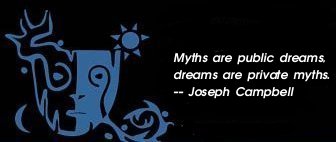|

"The Shapeshifter"
from The Hero With a Thousand Faces
by Joseph Campbell
Copyright © Joseph Campbell Foundation (jcf.org) and used with permission
 There is no final system for the interpretation of myths, and there will never be any such thing. Mythology is like the god Proteus,
"the ancient one of the sea, whose speech is sooth." The god "will make assay, and take all manner of shapes of things that creep upon
the earth, of water likewise, and of fierce fire burning."1
There is no final system for the interpretation of myths, and there will never be any such thing. Mythology is like the god Proteus,
"the ancient one of the sea, whose speech is sooth." The god "will make assay, and take all manner of shapes of things that creep upon
the earth, of water likewise, and of fierce fire burning."1
The life-voyager wishing to be taught by Proteus must, "grasp him steadfastly and press him yet the more," and at length he will
appear in his proper shape. But this wily god never discloses even to the skillful questioner the whole content of his wisdom. He will
reply only to the question put to him, and what he discloses will be great or trivial, according to the question asked. "So often as the
sun in his course stands high in mid heaven, then forth from the brine comes the ancient one of the sea, whose speech is sooth, before
the breath of the West Wind he comes, and the sea's dark ripple covers him. And when he is got forth, he lies down to sleep in the
hollow of the caves. And around him the seals, the brood of the fair daughter of the brine, sleep all in a flock, stolen forth from the
grey sea water, and bitter is the scent they breathe of the deeps of the salt sea."2 The Greek warrior-king Menelaus,
who was guided by a helpful daughter of this old sea-father to the wild lair, and instructed by her how to wring from the god his
response, desired only to ask the secret of his own personal difficulties and the whereabouts of his personal friends. And the god did
not disdain to reply.
Mythology has been interpreted by the modern intellect as a primitive, fumbling effort to explain the world of nature (Frazer);
as a production of poetical fantasy from prehistoric times, misunderstood by succeeding ages (Müller); as a repository of
allegorical instruction, to shape the individual to his group (Durkheim); as a group dream, symptomatic of archetypal urges within the depths
of the human psyche (Jung); as the traditional vehicle of man's profoundest metaphysical insights (Coomaraswamy); and as God's
Revelation to His children (the Church). Mythology is all of these. The various judgements are determined by the viewpoints of the
judges. For when scrutinized in terms not of what it is but of how it functions, of how it has served mankind in the past, of how it
may serve today, mythology shows itself to be as amenable as life itself to the obsessions and requirements of the individual, the
race, the age.
1 Odyssey, IV, 401, 417-418, translation by S.H. Butcher and Andrew Lang (London, 1879).
2Ibid., IV, 400-406.
Learn more about Joseph Campbell
at the Joseph Campbell Foundation website
Return to Mythic Passages Menu
Subscribe to the Mythic Passages e-magazine
|

